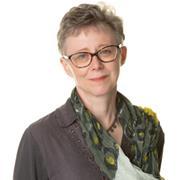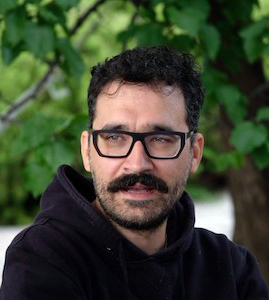Committee on the Wiener Laboratory
The Wiener Laboratory Committee of the Managing Committee of the ASCSA plays a significant role in generating and discussing policy for the WL. The Committee works to support the programs of the Wiener Laboratory: funding projects for young scholars, sponsoring field and laboratory research, providing resources for scholarly work, and disseminating research results. The Committee comprises experts from different subdisciplines of Archaeological Science, such as Osteoarchaeology, Zooarchaeology, Geoarchaeology, and Archaeobotany, as well as archaeologists who have a strong record of integrating the archaeological sciences into their research.
All the seven expert members are distinguished members of their scientific communities and hold key roles within their own institutions as well as within academic associations and disciplinary groups:
Prof. Scott Pike, Chair of the Committee
Scott Pike is Professor of Environmental Science and Archaeology and Chair of the Environmental Science Department at Willamette University. He has been affiliated with the Wiener Lab since 1992 and was its Acting Director from 1995-1997 and Committee Chair from 2011-2013. He is an archaeological geologist whose research focuses on the characterization and provenance of ancient white marbles used in the Mediterranean Basin. Currently, Pike is characterizing white marble outcrops in southern Naxos that may have been exploited during both the Bronze Age and Archaic. He is also using drones to accurately map and quantify the spatial extent and volume of ancient quarries in Naxos and other quarry sites in Greece. Since 2011, Pike has worked at the Neolithic site of the Ness of Brodgar in Orkney, Scotland where he looks at landscape reconstruction and discerning activity areas using drone imagery and geochemical analyses.
Prof. Megan B. Brickley
Megan B. Brickley (Ph.D., University of London) is Professor and Tier 1 Canada Research Chair in the Bioarchaeology of Human Disease at the Department of Anthropology, McMaster University, Canada. She has established herself as a world expert on the paleopathology of metabolic bone disease with particular recognition for her work on vitamin D deficiency. Her work is interdisciplinary and in addition to an ongoing research program on aspects of rickets and osteomalacia, recent work will facilitate exploration of the intimate relationship between maternal and fetal health. She has led work on the first explicit investigation of co-occurrence of metabolic disease and has recently established a framework for consideration of anemia in archaeological human remains. Brickley is also investigating how the health and nutrition of past populations may have been linked to the socio-cultural, economic and environmental conditions they faced in their communities. Brickley’s innovative research is helping build an understanding of human health and nutrition in past societies.
Assoc. Prof. Susan Kirkpatrick Smith
Susan Kirkpatrick Smith is Associate Professor of Anthropology in the Department of Geography and Anthropology at Kennesaw State University. She is a bioarchaeologist who has worked on the analysis of human skeletal remains from the Agora in Athens and from multiple sites in east Crete. She has conducted an osteology field school for undergraduate students at the INSTAP Study Center for East Crete. Her areas of study include health changes over time, juvenile trauma and pathologies, and the effects of militarism on the body. Her work has spanned from the Bronze Age to the early Byzantine Period.
Prof. Natalie Munro
Natalie Munro (Ph.D., University of Arizona) is Professor at the Department of Anthropology of the University of Connecticut. Munro has active research projects in Turkey, Israel and Greece and is published widely in peer-reviewed journals such as Science, PNAS, Current Anthropology, and Journal of Human Evolution. Her research has been supported by grants from the National Science Foundation and the Wenner-Gren Foundation for Anthropological Research. She has served as an Associate Editor for the Journal of Human Evolution and is a long-term co-chair and member of the board of the Connecticut Museum of Natural History. Her research interests include the Emergence of Agriculture, Zooarchaeology and Taphonomy, Animal domestication, Behavioral Ecology, Human Hunting, Human-Animal Interactions, Animals in Ritual Practice, Epipaleolithic and Neolithic Periods of Southwest Asia and the Eastern Mediterranean Region.
Prof. Cristiano Nicosia
Cristiano Nicosia (Ph.D., University of Milano) is Professor at the Department of Geosciences of the University of Padova. He is a geoarchaeologist working on the human impact on ancient landscapes, on paleo-environmental reconstruction and on the study of the daily lives of past individuals. He has worked on archaeological projects throughout Europe and as a member of archaeological expeditions in Tanzania, Iran, and Jordan. He co-edited the volume “Archaeological Soil and Sediment Micromorphology” for Wiley & Sons (2017), and the special issue of Journal of Archaeological Science: Reports “Geoarchaeology of Bronze Age Europe” (2019). In 2018 he authored the peer-reviewed monograph “Geoarcheologia delle stratificazioni urbane post-classiche” (Quasar, Rome). In 2020 he has been awarded an ERC Consolidator Grant for the project “GEODAP: GEoarchaeology of DAily Practices: extracting bronze age lifeways from the domestic stratigraphic record”.
Prof. William A. Parkinson
William A. Parkinson (Ph.D., University of Michigan) is Curator of Anthropology at the Field Museum of Natural History and Professor of Anthropology at the University of Illinois at Chicago. He is currently Head of Anthropological Research at the Field Museum. Bill is an anthropological archaeologist whose research explores the evolution of early agricultural villages in prehistoric southeastern Europe and the eastern Mediterranean. He is American Director of the Körös Regional Archaeological Project in Hungary and Co-Director of the Diros Project in Greece. Bill recently co-edited monographs about Neolithic research at Alepotrypa Cave (2018) and Copper Age excavations in southeastern Hungary (2021). He also has published articles in Hesperia, American Journal of Archaeology, Journal of Field Archaeology, and Journal of Archaeological Science, as well in other international, peer-reviewed, journals. His research has been funded by the National Science Foundation, the National Endowment for the Humanities, the National Geographic Society, and the Wenner-Gren Foundation.
Dr. Chantel White
Chantel White is the Teaching Specialist for Archaeobotany at the Center for the Analysis of Archaeological Materials (CAAM) at the University of Pennsylvania. She earned her Ph.D. in Archaeology from Boston University and her B.A. in Anthropology from Beloit College. Her research interests include macrobotanical analysis; experimental archaeobotany and cooking and plant-processing techniques; agricultural sustainability and the environment; ethnoarchaeology; urban garden systems; Greece, Jordan, Israel, Turkey.
Ex Officio Members:
Panagiotis Karkanas, Director, Wiener Laboratory
Mark L. Lawall, Chair, Managing Committee
Bonna Wescoat, Director, ASCSA
Liaison to the ASCSA Board of Trustees, Jane Buikstra